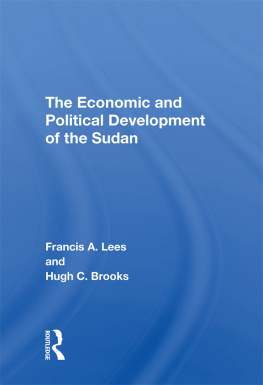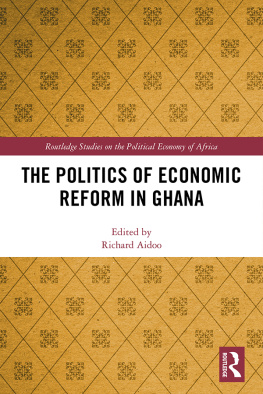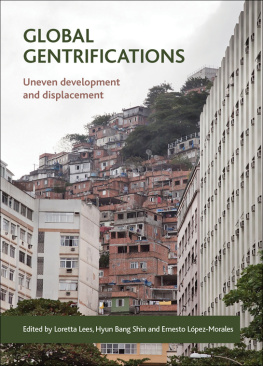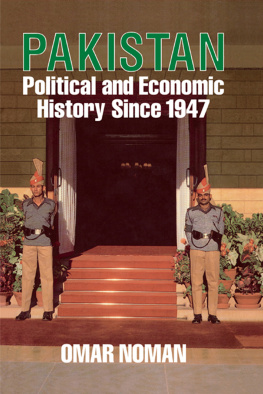First published 1977 by Westview Press
Published 2018 by Routledge
52 Vanderbilt Avenue, New York, NY 10017
2 Park Square, Milton Park, Abingdon, Oxon OX14 4RN
Routledge is an imprint of the Taylor & Francis Group, an informa business
Copyright 1977 Francis A. Lees and Hugh C. Brooks
All rights reserved. No part of this book may be reprinted or reproduced or utilised in any form or by any electronic, mechanical, or other means, now known or hereafter invented, including photocopying and recording, or in any information storage or retrieval system, without permission in writing from the publishers.
Notice:
Product or corporate names may be trademarks or registered trademarks, and are used only for identification and explanation without intent to infringe.
Library of Congress Cataloging in Publication Data
Lees, Francis A.
The economic and political development of the Sudan.
Bibliography: p.
Includes index.
1. SudanEconomic conditions. 2. SudanEconomic
policy. I. Brooks, Hugh C., 1922 joint author.
II. Title.
HC591.S8L43 330.962404 77-5252
ISBN 13: 978-0-367-02229-7 (hbk)
The purpose of this volume is to focus attention on the economic and political development of the Sudan, to describe the progress and problems encountered in this development process, and to bring into a single book a comprehensive consideration of the situation in the Sudan, In terms of land area the Sudan is the largest nation in Africa, and one of the most sparsely populated countries in Africa. The Sudan enjoys a strategic location, commanding part of the Red Sea approach to the Suez Canal, and lying in close proximity to the rapidly growing Middle Eastern markets. Complementary aspects of food supply in the Sudan and the Middle East the Sudan with its potential surplus the Middle East with its needs suggest a dynamic export growth pattern in the future.
Our actual research into the Sudan's development progress has more than confirmed early suspicions concerning lack of published information, data gaps and inadequacies, and outright contradictions in statistical information. Consequently, a considerable part of our work has been directed at piecing together semi-isolated fragments of data, analysing the why and how of statistical irreconcilables and ferreting out unpublished 'semi-official' information.
Given the paucity of published statistics and other information on the Sudan we are deeply indebted to the many Sudanese government officials and businessmen who were most generous with their time and knowledge during our travels through the Sudan. We would especially like to thank the following members of the Sudan government and civil service:
Sir Sid Ahmen, Ministry of Information; Ellayeb Almardi, Commissioner for Northern Darfur; Suleiman Abu Damis, Ministry of Industry and Mining; Saad Elizeirig, Director of the Department of Taxation; Modawi Eltiraifi, Ministry of Transportation and Communication; Abdez Rahman Yousif Haidoub, Assistant Commissioner of Labour Affairs, Kordofan Province; Fathel Rhman Ibn Idris, Manager, Research Department, Custom Service; Khamal Khalifa, Director, Forestry Department; Taha Salih Shavey, Director of Customs Duties, Treasury Department; Yousef Gafaar Siragainour, Ministry of Labour; Hassn Abdel Salam Suliman, Assistant Director, Central Bureau of Statistics.
A special note of appreciation to Ambassador Mustafa El Medani, Sudanese representative to the United Nations, and Bona Malwal Madut Ring, Minister of State for Information, for making the research visits to the Sudan possible.
We also appreciate the help our academic colleagues on the faculty of the University of Khartoum gave us in sharing their knowledge of and insight on the country. Among others Drs Yusuf Fadl Hasan (Director, Asia-Africa Institute), Ahmed H. El Jack and Abdel-Rahman Taha (Department of Business Administration, University of Khartoum) should be mentioned.
We were fortunate to visit several industrial plants in the Gezira and in the Khartoum areas to study the various manufacturing processes. Especially helpful were: Mr Azaim, Manager, Blue Nile Brewery, Abdallah Aman, Financial Controller, Gezira Board; Abdulla Parum, Financial Controller, Sudan Gezira Board; Mohamed Khalifa, Manager, Sudan Textile Mill.
We are also indebted to the many staff experts at the various international organisations, most especially to Mr John Ducker, East African Division, The World Bank, who not only provided information but was also helpful with his comments concerning portions of the text. Also to Michele Guerard, Fiscal Affairs Department, International Monetary Fund; Antoinette Beguin, Chief of the Comprehensive National Employment Policies Branch, International Labour Office, Geneva.
Among the American government officials that were especially helpful were Carl Middleton, Director, Middle East and Africa, Overseas Private Investment Corporation; and Fred Gerlach, Economic Attach, US Embassy, Khartoum.
Finally, gratitude must be expressed to Margaret Willaum and Kay Pellman, who suffered through the various drafts and typings while keeping up with their other tasks and maintaining their good spirits.
We hope that all the people who have helped us will feel that their efforts and time were worthwhile and that the results will be of use to their departments and to others interested in the development of the modern Sudan. A large portion of the insights of this book have been derived through their help and any shortcomings must be assumed by the authors.
F.A.L.
H.C.B.
September 1976
Geography and history have not treated the Sudan kindly. Years ago when the Turks, and later the Egyptians and the British governed the area, few of them disagreed nor did the majority of the local inhabitants that the Sudan was a strange place in which to live. Mostly arid, conquered by many, it is only recently that the Sudan has begun to offer a better life to its people. Today, most of its leaders are working to develop the country into a nation. How well they succeed will affect the fortunes of not only the seventeen million Sudanese but perhaps over one hundred million residents of Africa and the Middle East.
A nation is born in time and place geography is its mother and history its father. The Sudan was really not born until the nineteenth century and even then it faced several handicaps. Only recently have its advantages begun to be realised.
Several thousand years ago the climate of the Sudan was moist and its soil fertile. Over the past five thousand years the climate has changed and the people have had to adjust to desert conditions. Water is still the key to agricultural development and while the Nile is not as important to the Sudan as it is to Egypt, most of the people depend upon it for their livelihood.







